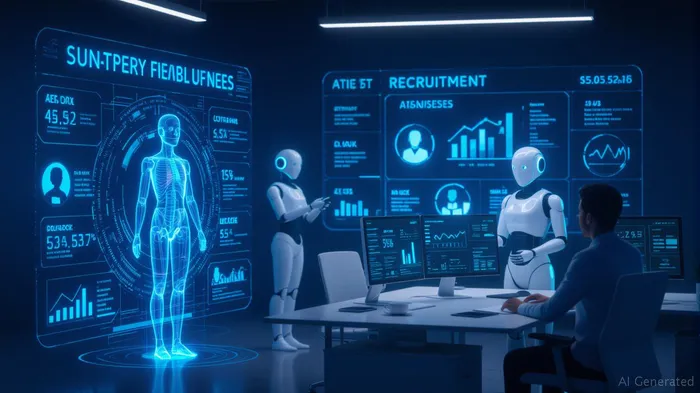AI-Driven Workforce Restructuring: A Catalyst for Disruption in Job Search Platforms
The recent layoffs at Indeed and Glassdoor—1,300 jobs cut to fuel AI integration—are not merely a cost-saving measure but a seismic shift in how the job search industry operates. This restructuring signals a broader trend: automation is no longer optional but essential for survival. Companies like Indeed, now merging Glassdoor into its platform, are betting their futures on AI to streamline recruitment, reduce manual labor, and outpace competitors. For investors, this is a clarion call to reassess the job search sector's winners and losers.

The Layoff as a Strategic Pivot, Not a Crisis
Indeed's cuts, targeting R&D, sustainability, and HR teams, are deliberate moves to eliminate roles AI can automate. CEO Hisayuki Idekoba's vision of an “AI-first future” prioritizes efficiency: AI already generates 33% of the company's new code, with a target of 50% by 2025. This shift isn't just about cutting costs—it's about owning the future of recruitment. By centralizing Glassdoor's operations into Indeed, the company aims to eliminate redundancies and create a unified AI-driven platform. The result? Faster hiring, better candidate matches, and a streamlined user experience.
Why This Matters for the Industry
The job search sector is ripe for disruption. Traditional platforms like LinkedIn and Indeed face existential pressure as AI tools like ChatGPT and niche players (e.g., JobWizard, CareerPen) democratize access to resume writing, interview prep, and skill assessment. Consider the data:
- 80% of job seekers report faster, more relevant matches using AI tools.
This growth isn't just about tech giants—it's a gold rush for startups and established firms alike. Companies that embed AI into their core operations will dominate; those that don't risk irrelevance.
Winners and Losers in the AI-Driven Job Search Race
Winners:
1. AI-first platforms with proprietary tools: Companies like WriteSmart (AI resume optimization) or Intervue (AI interview prep) are carving niches. Their focus on hyper-personalization and skill-matching gives them an edge over generic platforms.
2. Legacy players pivoting aggressively: Indeed's merger with Glassdoor and Salesforce's Agentforce integration (cutting hiring time by 50%) show how scale plus AI can create moats.
3. Ethical AI innovators: As scrutiny grows, platforms like Pymetrics (bias-free assessments) will attract trust—and market share.
Losers:
- Stagnant incumbents: Firms relying on manual processes (e.g., traditional staffing agencies) will struggle to compete.
- Overhyped startups: AI tools lacking data depth or user-centric design (e.g., generic chatbots) will fade as the market matures.
Investment Opportunities: Where to Look
The sector's upheaval creates two clear paths for investors:
1. AI Infrastructure Leaders
Platforms like Job Hunt Mode or AutoApplyAI that embed AI into core functions—matching candidates, automating screening, or generating job descriptions—are critical. Look for companies with:
- Proprietary algorithms: Avoid me-too products; seek unique IP (e.g., multilingual support or niche industry expertise).
- Enterprise partnerships: Tools adopted by Fortune 500 companies (e.g., Indeed's tie-up with Salesforce) signal scalability.
2. Upskilling and Reskilling Platforms
As 47% of workers fear AI-driven job loss, demand for retraining is surging. CareerHub AI or Onward Search (mentioned in the Indeed report) offer dual benefits:
- They align with employer needs for skilled talent.
- They monetize the “learn-and-earn” model, where training leads to job placements.
Risks and Considerations
- Regulatory hurdles: EU AI Act proposals could penalize opaque algorithms, favoring transparent platforms.
- Job displacement backlash: Public sentiment against AI-driven layoffs (e.g., Ford's warning about white-collar job losses) may spur regulatory pushback.
- Overestimation of AI's capabilities: Tools like ChatGPT lack real-time data and personalization, limiting their utility for complex roles.
Conclusion: Bet on Adaptability
The job search industry is at an inflection pointIPCX--. Investors should prioritize companies that blend AI innovation with human-centric design—tools that augment, not replace, decision-making. Legacy players like Indeed and Glassdoor are betting their futures on this pivot; startups must prove they can scale.
For long-term gains, focus on firms with:
- Scalable AI models (check ).
- Partnerships with enterprises or governments (e.g., Pymetrics' work with Fortune 500 firms).
- Clear ethical frameworks (avoid companies facing bias lawsuits).
The future belongs to those who turn AI from a cost-cutting tool into a competitive weapon. The layoffs at Indeed and Glassdoor are just the opening act.
Delivering real-time insights and analysis on emerging financial trends and market movements.
Latest Articles
Stay ahead of the market.
Get curated U.S. market news, insights and key dates delivered to your inbox.



Comments
No comments yet